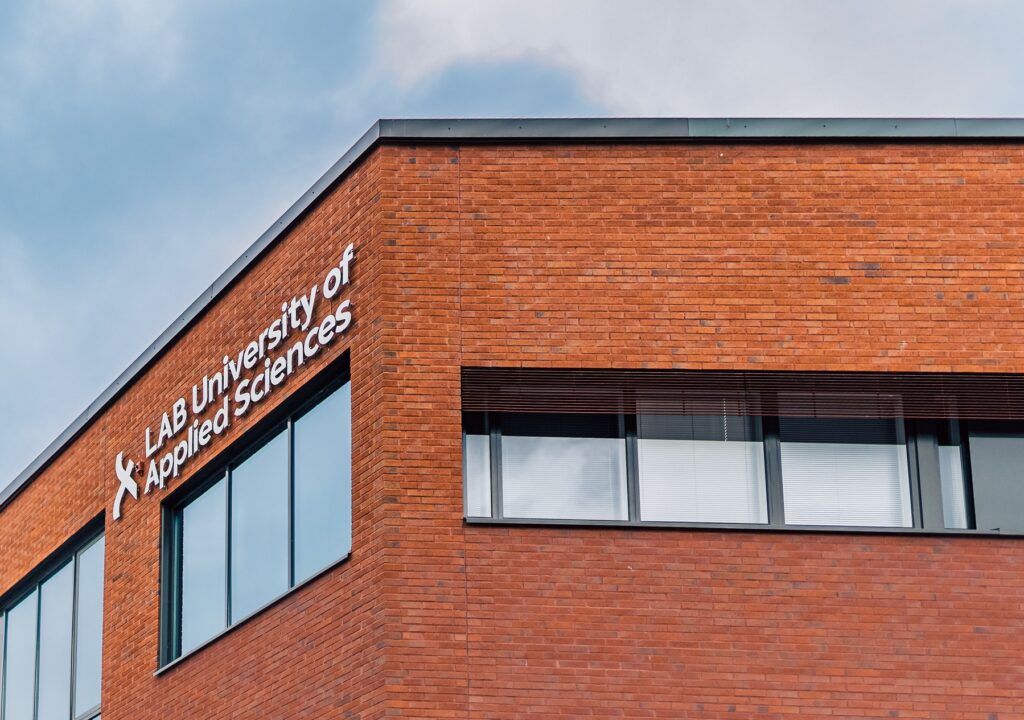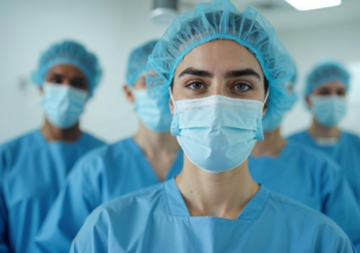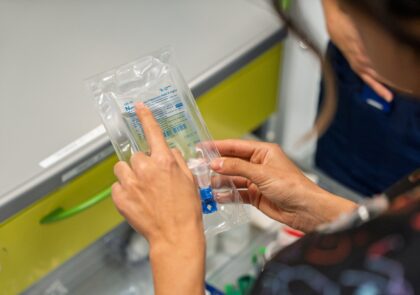
Universities of applied sciences provide higher education for professional expert tasks and duties based on the requirements of work and its development. It is important to promote diversity, accessibility, and equality of working life for employment. Thus, the successful integration of those who have moved to Finland is integral. A group of multicultural nursing students from LAB University of Applied Sciences completed their practical training in a joint project in Koski School Center, the City of Imatra.
Authors: Sini Hämäläinen & Sanna Imeläinen
International student experiences in working life
Universities of applied sciences provide higher education for professional expert tasks and duties based on the requirements of working life and its development. In addition, they carry out applied research, developmental innovation activities, and regional development. LAB UAS provides education in 3 campuses: Lahti, Lappeenranta, and online. LAB strategy 2030 “best of both worlds” includes the idea of a fairly and boldly better world of work. In other words, it is important to support the professional growth of students toward the needs of their future working life. (Universities of Applied Sciences Act 932/2014; LAB University of Applied Sciences 2024a.)
In 2022, 1,118 international degree students studied at LAB UAS, and they represented 87 different nationalities (LAB University of Applied Sciences 2024a). In the faculty of social and health care, it has been possible to study a bachelor’s degree program in nursing and paramedic nursing. As for public health nursing, studies have been commenced two times a year in Finnish. (LAB University of Applied Sciences 2024b.) It is important to promote diversity, accessibility, and equality of working life for employment. Thus, the successful integration of those who have moved to Finland is integral. In an equal society, different population groups are represented in different organizations and work tasks. (Finnish Institute of Health and Welfare 2023.) WHO (2024) estimates a shortage of 4.5 million nurses by the year 2030. Highly educated professionals, such as nurses, are also needed in Finland (Local Government and County Employers 2024). There is a need for nursing professionals both nationally and internationally.
According to Bergbom et al. (2020), many employees from abroad and many workplaces in Finland are more multicultural than before. The variety of cultures benefits from increasing innovation and creativity in organizations, which increases diversity. In addition, increasing knowledge capital, improved services for clients, and increased appreciation of tolerance and diversity in the organization are seen as advantages. Organizational diversification is seen necessary for providing a sufficient workforce and competence and for supporting internationalization of the organization. On the other hand, the lack of language skills has been seen as a challenge. (Bergbom et al. 2020.) Awareness is important for managing challenges. According to Ashipala and Matundu (2023), educational institutions can prepare for this by developing targeted interventions and strategies encountered by nursing students during clinical practice in a multilingual clinical environment.
Multidisciplinary learning modules are the basis of cooperation and projects
Koski School Center is an elementary school in Imatra. The national core curriculum for basic education ensures that the knowledge and skills will remain strong in the future, both nationally and internationally. Schools can develop their operating methods to increase the pupils’ interest in and motivation for learning. The school culture should promote learning, interaction, participation, well-being, and a sustainable way of living. The general aim is to ensure the well-being and safety of every pupil. Cultural diversity and language awareness are also key principles guiding the development of school culture. The use of various languages in the school’s daily life is seen as natural, and languages are appreciated. (Finnish National Agency for Education 2023.) Multidisciplinary learning modules provide a good framework for collaboration which has been going on for several years.
Practical training in a school environment is an excellent way to learn about Finnish society and culture. An understanding of the everyday life of the population will help to work in health care in the future and become attached to Finland, adding nursing professionals. In 2023, four nursing student teams spent one week in the school guiding and educating 9-13 years old children on issues related to health and well-being. The project suited well to meet the criteria and objectives for children, adolescents, families, and community nursing competence and gave a possibility to observe and work amongst children in their natural environment. In addition, students learned important teamwork and project skills for the future, and the cross-sectoral and multicultural approach offered a unique learning opportunity. Further development of practical training opportunities has been supported by student feedback from the previous academic years:
I couldn’t imagine having such an experience during my education. I was able to practice many important skills that are relevant for my career and work with children in their natural environment. Additionally, we got the opportunity of getting to know one of the world’s best educational systems. Thank you for this unique opportunity!
It was a great experience I learned a lot of new things. The teachers really helped us with everything.
The project gave me many experiences and knowledge. According to my view it was really successful and well managed.
Competence gained from the project
The diverse and extensive project provides a good framework for learning. International students train together with Finnish nursing students, and multiculturalism is realized in a genuine learning environment. Furthermore, the project targets international pupils in a comprehensive school, supporting the diversity of school culture. After the clinical training in a project, the student can:
- Create a professional communicational relationship while respecting the client’s self-determination
- Plan, implement, and evaluate nursing care by using methods that promote health
- Utilize different educational and interview techniques regarding/considering the client’s resources when educating clients of different ages
- Reason the clinical decisions that he/she has made
- Interpret the health problems and threats of both individuals and communities and support and encourage clients to take responsibility for maintaining health while taking sustainable development into consideration
- Implement infection control methods in a school surrounding
- Understand the importance of multi-professional networks and teamwork in client care
- Gain an understanding of the cultural aspects of families and communities and consider them when planning care and education
Mostly a good experience with the project
The public health nursing students did a survey on the experiences of the project as a part of their studies at the end of 2023. The survey was answered by 61.5% of the participating students. The intensive weeks were seen as a good and effective way to implement the project. A good average was given to the workload of the project, cooperation with teachers, and the new knowledge and skills learned in the project. The lowest average was given to the hours and material preparing for the intensive weeks, for which clarity and more information on working with children was desired. (Kouvonen et al. 2024.)
All the school teachers who responded to the survey were positive about the project. The teaching material used during the intensive weeks was good. According to the teachers, LAB students performed well in their teaching and guiding duties. A particularly good review was the success of the collaboration with LAB teachers. Collaboration with students was also good. The teachers found the topics of the project useful, and the time spent on the project suited the class schedule. In open feedback, the possibility of linguistic development offered by the project was seen as positive. (Kouvonen et al. 2024.)
Conclusions
Overall, the project has been beneficial to all parties. Students have been able to practice their project skills and see how children’s age and developmental stage is reflected in the school environment. Intensive weeks have provided children and LAB UAS students the opportunity to practice English and gain knowledge of different cultures. (Kouvonen et al. 2024.) In addition, it is not easy for students to get places for clinical training in English. In this project, the training was made possible at the same time for several LAB UAS students. It is important to respond to the shortage of nurses. Good experiences help students integrate into the area and the wellbeing services county.
According to the Local Government and County Employers (2024), the professionals are not sufficiently educated concerning the demand for services. The employment rate of people with foreign backgrounds was about 10-15% lower and the unemployment rate about 5-10% higher than people with Finnish backgrounds. Typical challenges faced in employment at the individual level are the lack of competence in domestic languages, the incompatibility of education and work experience with the Finnish labor market, and the lack of networks that support employment. However, those who have moved because of work and study are employed well. (Integration.fi 2024.)
The project has received a lot of positive feedback in general, and the project was also carried out in Lappeenranta. The project is planned to continue in the future in both cities, Imatra and Lappeenranta. It would be great to be able to expand the implementation to smaller municipalities in the region as well. Training opportunities for health and well-being promotion will be increasingly needed in the future, as public health nurse training will begin in English in the beginning of 2025. Nurses are central to primary health care and are often the first and sometimes the only health professional that people see (WHO 2024).
References
Ashipala, D. O. & Matundu, M. 2023. Nursing students’ experiences of communication in a multilingual and multicultural clinical environment: A qualitative study. Nursing Open. 2023;00:1–10. Cited 29.8.2024. Available at https://doi.org/10.1002/nop2.1939
Bergbom, B., Toivanen, M. & Väänänen, A. 2020. Monimuotoisuusbarometri 2020. Finnish Institute of Occupational Health. Helsinki. Cited 29.8.2024. Available at https://urn.fi/URN:ISBN:9789522619471
Finnish Institute of Health and Welfare. 2023. Maahanmuutto ja kulttuurinen moninaisuus. Työelämä. Cited 29.8.2024. Available at https://thl.fi/fi/web/maahanmuutto-ja-kulttuurinen-moninaisuus/kotoutuminen-ja-osallisuus/tyoelama
Finnish National Agency for Education. 2023. National core curriculum for basic education. Cited 29.8.2024. Available at https://www.oph.fi/en/education-and-qualifications/national-core-curriculum-basic-education
Integration.fi. 2024. Maahanmuuttajien työmarkkina-asema valtaväestöä heikompi. Cited 26.11.2024. Available at https://kotoutuminen.fi/maahanmuuttajien-tyomarkkina-asema
Kouvonen, P., Airee. R., Hämäläinen, S. & Imeläinen, S. 2024. Kosken koulun projekti ‒ kehittäminen toiminnan jatkon tueksi. LAB Focus blog. Cited 26.11.2024. Available at https://blogit.lab.fi/labfocus/kosken-koulun-projekti-%E2%80%92-kehittaminen-toiminnan-jatkon-tueksi/
LAB University of Applied Sciences. 2024a. About us. Cited 29.8.2024. Available at https://lab.fi/en/info/about-us
LAB University of Applied Sciences. 2024b. Study Guide. Cited 29.8.2024. Available at https://opinto-opas.lab.fi/
Local Government and County Employers. 2024. Hyvinvointialueilla vakava pula hoitajista, lääkäreistä ja sosiaalityöntekijöistä. Cited 26.11.2024. Available at https://www.kt.fi/uutiset-ja-tiedotteet/2024/hyvinvointialueilla-vakava-pula-laak%C3%A4reista-ja-sosiaalityontekijoista
Universities of Applied Sciences Act 932/2014. Finlex. Cited 29.8.2024. Available at https://www.finlex.fi/en/laki/kaannokset/2014/en20140932
WHO. 2024. Nursing and midwifery. Cited 26.11.2024. Available at https://www.who.int/news-room/fact-sheets/detail/nursing-and-midwifery
Authors
Sini Hämäläinen is a Senior Lecturer at the Faculty of Health Care and Social Services at LAB University of Applied Sciences. She has been involved in the Koski school project from the beginning and has guided international students for a long time.
Sanna Imeläinen is a Senior Lecturer at the Faculty of Health Care and Social Services at LAB University of Applied Sciences. She has extensive experience in school health care and teaches international and public health nursing students.
Illustration: Teemu L.
Reference to this article
Hämäläinen, S. & Imeläinen, S. 2024. Multicultural Project Promoting Health and Well-being. LAB RDI Journal. Cited and the date of citation. Available at https://www.labopen.fi/lab-rdi-journal/a-multicultural-project-promoting-health-and-well-being/






